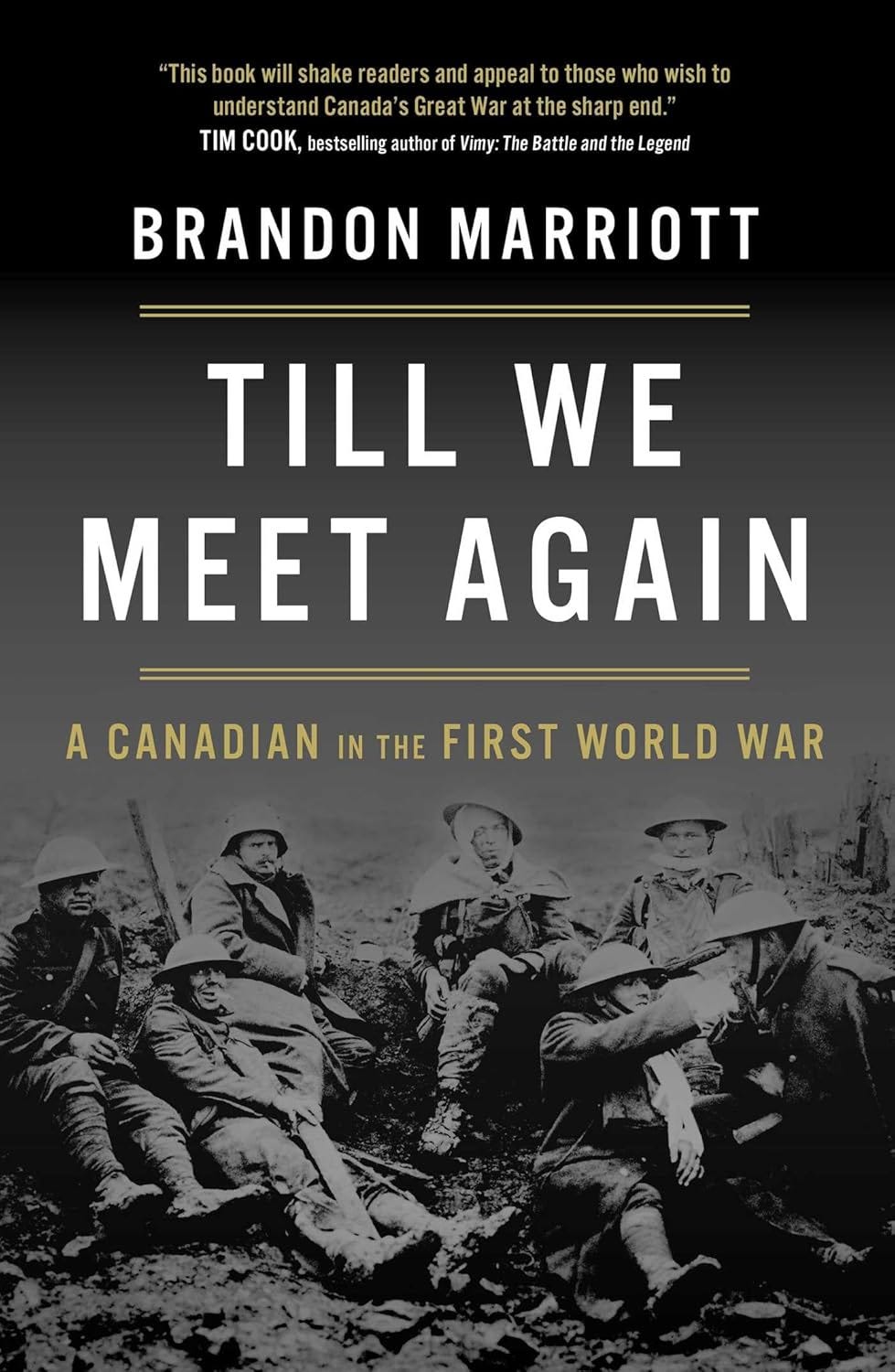Till We Meet Again: A Canadian in the First World War by Brandon Marriott
Vivid, fascinating, and—inescapably—horrifying: Historian Brandon Marriott recounts an ancestor’s WWI experiences
What passing-bells for these who die as cattle?
— Only the monstrous anger of the guns.
Only the stuttering rifles’ rapid rattle
Wilfred Owen (1893-1918), “Anthem for Doomed Youth”Discovering century-old letters by his wife’s great-grandfather, Brandon Marriott reacted as Long John Silver would to pieces of eight. For historian Marriott, these fragile letters, with faded ink and a dead louse squashed between them, were pure treasure. Their richesse of information inspired him to write Till We Meet Again, a riveting account of a young British Columbia farmer’s experiences in World War I Europe.
“One of Marriott’s story-telling gifts is to make you feel edge-of-the-seat suspenseful throughout Till We Meet Again, even though you know what will happen.”
Like many his age, Lester Harper found the idea of going “Over There” as fun as the catchy George M. Cohan song of that name. Wait to be drafted? Him? No way! He rushed to enlist. After all, growing up in Manitoba, Harper had been a crack shot at downing rabbits and ducks. How different could shooting at enemy soldiers be?
At Bordon Military Camp in Hampshire, England, the confident lad dazzled Canadian army brass by firing 165 rounds in “Mad Minute” training sessions. As a result, the brass fast-tracked him from lowly private to musketry instructor, a corporal-rank position with higher pay. It was a heady beginning, as reflected in Harper’s upbeat November 12, 1916 letter to wife Mabel. “Fritz” would soon weary of war, he predicted. “I may see Canada by next fall!” Oh, the poignancy of that optimistic exclamation mark.
Harper’s preparation for war—talk about dubious concepts—also included thumping out the hymn “God Be with You Till We Meet Again” on the piano for soldiers departing for France. And, sticking bayonets into straw dummies, as if enemy soldiers would similarly stay passive.
One of Marriott’s story-telling gifts is to make you feel edge-of-the-seat suspenseful throughout Till We Meet Again, even though you know what will happen. For example, the battlefront reality that awaited Harper. Contrary to the cheery promise of “Over There,” he saw whole villages’ worth of corpses, white bones sticking out through bloody clothes. Sun-charred faces gaping with the holes left by rats after devouring eyes and tongues.
Until then, as Marriott observes, Britain’s epic war disaster had been the 1854 Charge of The Light Brigade, against Russian troops in Crimea. The infamous Charge now took a bloody back seat to the four-month Battle of the Somme. For Harper and 120,000 other British and Dominion soldiers, the Somme was a walk into nonstop gunfire. By the end, 19,240 of them were dead, 38,320 wounded. And how ineffectual Bordon, with its easy-to-see targets, had been! At the Somme, Harper could only aim his Lee-Enfield rifle into darkness and confusion.
Marriott alternates Harper’s war experiences with those from back home. Some were agonizingly sad, like the death of his and Mabel’s baby girl from dysentery. Some ludicrous, like the time his hapless brother-in-law crashed a sleigh into Mabel’s buggy, sending her flying.
As further proof of Marriott’s skill at storytelling, he includes humorous postcards of the time. One shows a soldier’s typical response when asked for directions: “Yer knows that dead ’orse ’cross the road? Well, keep straight on.”
Of the 430,000 Canadians who fought, Harper was one of only 1,937 awarded Distinguished Conduct Medals. At Brétencourt he’d tossed a grenade, and then, rifle blazing, charged David-like at a Goliath-sized mass of Germans. It wasn’t heroism that galvanized him, believes Marriott; rather anger, frustration, and the need to in avenge dead comrades.
That had all faded by 1939, when Prime Minister Mackenzie King announced on the radio that Canada was joining the war against Hitler. Harper, now middle-aged and a provincial assessor in B.C.’s Peace River Country, could only listen silently as tears streamed down his face.
About the Author
Vancouver-born Brandon Marriott received his doctorate in history from Oxford University. Following a postdoctoral fellowship at the University of London, he taught undergraduate history at Simon Fraser University. Married to a Canadian diplomat, Marriott has held academic positions around the world. He’s now back at SFU as a research associate, and avid about both reading and skiing.
About the Reviewer
A Vancouver freelance writer/editor, Melanie Jackson is also the author of such middle-grade/young-adult suspensers as the Dinah Galloway Mystery Series (Orca). Other novels by Melanie include Medusa’s Scream, named by the Canadian Children’s Book Centre as a Best Book, 2018. CCBC also awarded Melanie a TD-CCBC Book Week touring-author award.
Book Details
Simon & Schuster Canada, September 30, 2025
Language: English
Hardcover: 302 pages.
ISBN: 978-1-6682-0823-6. EPUB ISBN: 978-1-6682-0900-4




